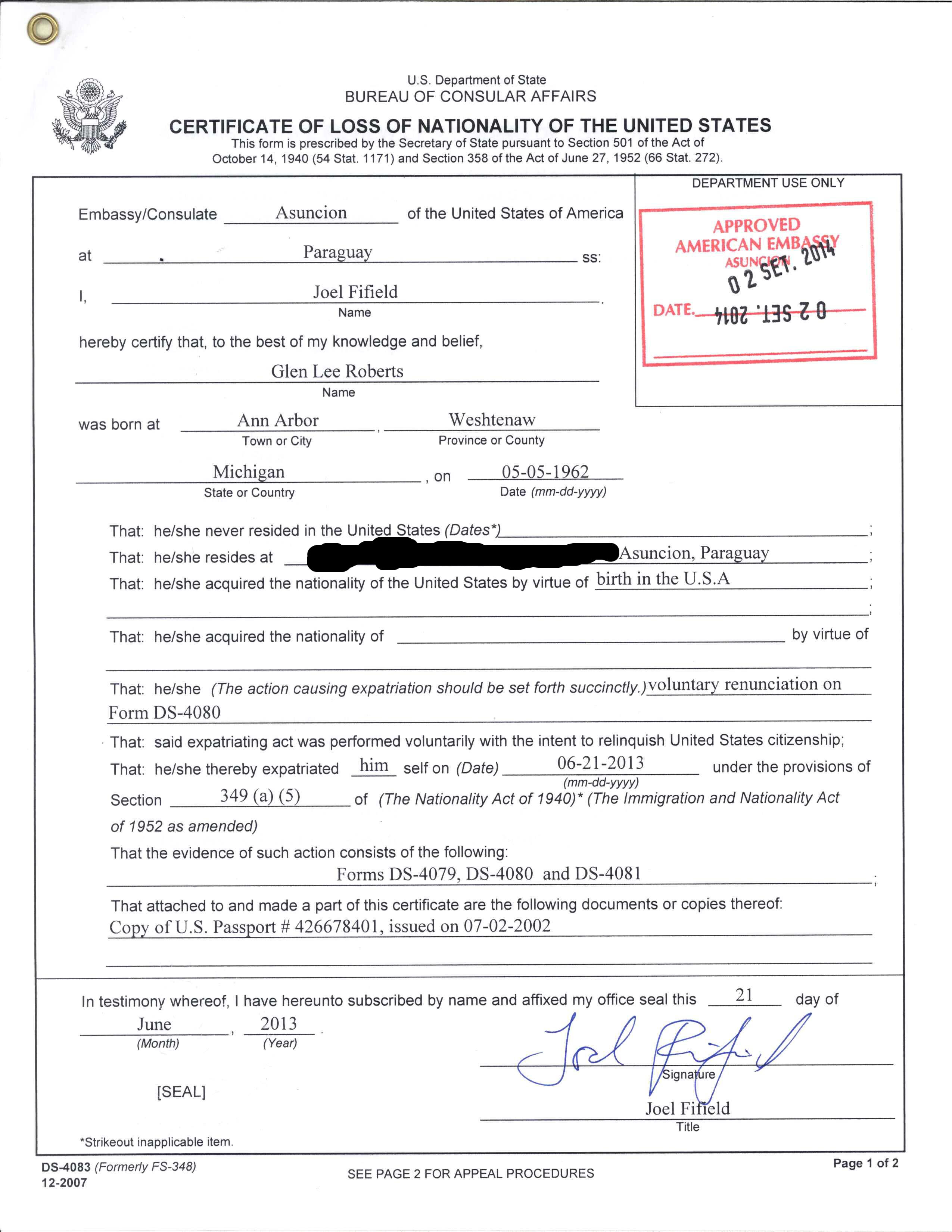|
US Citizenship
Citizenship of the United States is a legal status that entails Americans with specific rights, duties, protections, and benefits in the United States. It serves as a foundation of fundamental rights derived from and protected by the Constitution and laws of the United States, such as freedom of expression, due process, the rights to vote (however, not all citizens have the right to vote in all federal elections, for example, those living in Puerto Rico), live and work in the United States, and to receive federal assistance. There are two primary sources of citizenship: birthright citizenship, in which persons born within the territorial limits of the United States are presumed to be a citizen, or—providing certain other requirements are met—born abroad to a United States citizen parent, and naturalization, a process in which an eligible legal immigrant applies for citizenship and is accepted. The first of these two pathways to citizenship is specified in the Citizenship ... [...More Info...] [...Related Items...] OR: [Wikipedia] [Google] [Baidu] |
United States Nationality Law
United States nationality law details the conditions in which a person holds United States nationality. In the United States, nationality is typically obtained through provisions in the U.S. Constitution, various laws, and international agreements. Citizenship is a right, not a privilege. While the domestic documents often use citizenship and nationality interchangeably, nationality refers to the legal means in which a person obtains a national identity and formal membership in a nation and citizenship refers to the relationship held by nationals who are also citizens. Individuals born in any of the 50 U.S. states, the District of Columbia or almost any inhabited territory are natural-born United States citizens. The sole exception is American Samoa, where individuals are typically non-citizen U.S. nationals at birth. Foreign nationals living in any state or qualified territory may naturalize after becoming permanent residents and meeting a residence requirement (normally ... [...More Info...] [...Related Items...] OR: [Wikipedia] [Google] [Baidu] |
Lawful Permanent Residents (United States)
A green card, known officially as a permanent resident card, is an identity document which shows that a person has permanent residency in the United States. ("The term 'lawfully admitted for permanent residence' means the status of having been lawfully accorded the privilege of residing permanently in the United States as an immigrant in accordance with the immigration laws, such status not having changed."). Green card holders are formally known as lawful permanent residents (LPRs). , there are an estimated 13.9 million green card holders, of whom 9.1 million are eligible to become United States citizens. Approximately 65,000 of them serve in the U.S. Armed Forces. Green card holders are statutorily entitled to apply for U.S. citizenship after showing by a preponderance of the evidence that they, among other things, have continuously resided in the United States for one to five years and are persons of good moral character.''Al-Sharif v. United States Citizenship and Imm ... [...More Info...] [...Related Items...] OR: [Wikipedia] [Google] [Baidu] |
Army
An army (from Old French ''armee'', itself derived from the Latin verb ''armāre'', meaning "to arm", and related to the Latin noun ''arma'', meaning "arms" or "weapons"), ground force or land force is a fighting force that fights primarily on land. In the broadest sense, it is the land-based military branch, service branch or armed service of a nation or country. It may also include aviation assets by possessing an army aviation component. Within a national military force, the word army may also mean a field army. In some countries, such as France and China, the term "army", especially in its plural form "armies", has the broader meaning of armed forces as a whole, while retaining the colloquial sense of land forces. To differentiate the colloquial army from the formal concept of military force, the term is qualified, for example in France the land force is called ''Armée de terre'', meaning Land Army, and the air and space force is called ''Armée de l'Air et de l’Espac ... [...More Info...] [...Related Items...] OR: [Wikipedia] [Google] [Baidu] |
American Civil War
The American Civil War (April 12, 1861 – May 26, 1865; also known by other names) was a civil war in the United States. It was fought between the Union ("the North") and the Confederacy ("the South"), the latter formed by states that had seceded. The central cause of the war was the dispute over whether slavery would be permitted to expand into the western territories, leading to more slave states, or be prevented from doing so, which was widely believed would place slavery on a course of ultimate extinction. Decades of political controversy over slavery were brought to a head by the victory in the 1860 U.S. presidential election of Abraham Lincoln, who opposed slavery's expansion into the west. An initial seven southern slave states responded to Lincoln's victory by seceding from the United States and, in 1861, forming the Confederacy. The Confederacy seized U.S. forts and other federal assets within their borders. Led by Confederate President Jefferson ... [...More Info...] [...Related Items...] OR: [Wikipedia] [Google] [Baidu] |
United States Senate
The United States Senate is the upper chamber of the United States Congress, with the House of Representatives being the lower chamber. Together they compose the national bicameral legislature of the United States. The composition and powers of the Senate are established by Article One of the United States Constitution. The Senate is composed of senators, each of whom represents a single state in its entirety. Each of the 50 states is equally represented by two senators who serve staggered terms of six years, for a total of 100 senators. The vice president of the United States serves as presiding officer and president of the Senate by virtue of that office, despite not being a senator, and has a vote only if the Senate is equally divided. In the vice president's absence, the president pro tempore, who is traditionally the senior member of the party holding a majority of seats, presides over the Senate. As the upper chamber of Congress, the Senate has several powers ... [...More Info...] [...Related Items...] OR: [Wikipedia] [Google] [Baidu] |
Higher Education In The United States
Higher education in the United States is an optional stage of formal learning following secondary education. Higher education is also referred as post-secondary education, third-stage, third-level, or tertiary education. It covers stages 5 to 8 on the International ISCED 2011 scale. It is delivered at 4,360 Title IV degree-granting institutions, known as colleges or universities. These may be public or private universities, research universities, liberal arts colleges, community colleges, or for-profit colleges. US higher education is loosely regulated by the government and by several third-party organizations. In Spring 2022, about 16 million students 9.6 million women and 6.6 million men enrolled in degree-granting colleges and universities in the U.S. Of the enrolled students, 45.8% enrolled in a four-year public institution, 27.8% in a four-year private institution, and 26.4% in a two-year public institution. College enrollment has declined every year since a peak in 201 ... [...More Info...] [...Related Items...] OR: [Wikipedia] [Google] [Baidu] |
Relinquishment Of United States Nationality
Relinquishment of United States nationality is the process under federal law by which a U.S. citizen or national voluntarily and intentionally gives up that status and becomes an alien with respect to the United States. Relinquishment is distinct from denaturalization, which in U.S. law refers solely to cancellation of illegally procured naturalization. explicitly lists all seven potentially expatriating acts by which a U.S. citizen can relinquish that citizenship. ''Renunciation of United States citizenship'' is a legal term encompassing two of those acts: swearing an oath of renunciation at a U.S. embassy or consulate in foreign territory or, during a state of war, at a U.S. Citizenship and Immigration Services office in U.S. territory. The other five acts are: naturalization in a foreign country; taking an oath of allegiance to a foreign country; serving in a foreign military; serving in a foreign government; and committing treason, rebellion, or similar crimes. Beginnin ... [...More Info...] [...Related Items...] OR: [Wikipedia] [Google] [Baidu] |
Allegiance
An allegiance is a duty of fidelity said to be owed, or freely committed, by the people, subjects or citizens to their state or sovereign. Etymology From Middle English ''ligeaunce'' (see medieval Latin ''ligeantia'', "a liegance"). The ''al-'' prefix was probably added through confusion with another legal term, ''allegeance'', an "allegation" (the French ''allegeance'' comes from the English). ''Allegiance'' is formed from "liege," from Old French ''liege'', "liege, free", of Germanic origin. The connection with Latin ''ligare'', "to bind," is erroneous. Usage Traditionally, English legal commentators used the term ''allegiance'' in two ways. In one sense, it referred to the deference which anyone, even foreigners, was expected to pay to the institutions of the country where one lived. In the other sense, it meant national character and the subjection due to that character. Types * Local allegiance * Natural allegiance United Kingdom The English doctrine, which was at one ... [...More Info...] [...Related Items...] OR: [Wikipedia] [Google] [Baidu] |
United States Congress
The United States Congress is the legislature of the federal government of the United States. It is bicameral, composed of a lower body, the House of Representatives, and an upper body, the Senate. It meets in the U.S. Capitol in Washington, D.C. Senators and representatives are chosen through direct election, though vacancies in the Senate may be filled by a governor's appointment. Congress has 535 voting members: 100 senators and 435 representatives. The U.S. vice president The vice president of the United States (VPOTUS) is the second-highest officer in the executive branch of the U.S. federal government, after the president of the United States, and ranks first in the presidential line of succession. The vice pr ... has a vote in the Senate only when senators are evenly divided. The House of Representatives has six non-voting members. The sitting of a Congress is for a two-year term, at present, beginning every other January. Elections are held every even-n ... [...More Info...] [...Related Items...] OR: [Wikipedia] [Google] [Baidu] |
Article One Of The United States Constitution
Article One of the United States Constitution establishes the legislative branch of the federal government, the United States Congress. Under Article One, Congress is a bicameral legislature consisting of the House of Representatives and the Senate. Article One grants Congress various enumerated powers and the ability to pass laws " necessary and proper" to carry out those powers. Article One also establishes the procedures for passing a bill and places various limits on the powers of Congress and the states from abusing their powers. Article One Vesting Clause grants all federal legislative power to Congress and establishes that Congress consists of the House of Representatives and the Senate. In combination with the Vesting Clauses of Article Two and Article Three, the Vesting Clause of Article One establishes the separation of powers among the three branches of the federal government. Section 2 of Article One addresses the House of Representatives, establishing that membe ... [...More Info...] [...Related Items...] OR: [Wikipedia] [Google] [Baidu] |
Fourteenth Amendment To The United States Constitution
The Fourteenth Amendment (Amendment XIV) to the United States Constitution was adopted on July 9, 1868, as one of the Reconstruction Amendments. Often considered as one of the most consequential amendments, it addresses citizenship rights and equal protection under the law and was proposed in response to issues related to former slaves following the American Civil War. The amendment was bitterly contested, particularly by the states of the defeated Confederacy, which were forced to ratify it in order to regain representation in Congress. The amendment, particularly its first section, is one of the most litigated parts of the Constitution, forming the basis for landmark Supreme Court decisions such as '' Brown v. Board of Education'' (1954) regarding racial segregation, '' Roe v. Wade'' (1973) regarding abortion ( overturned in 2022), '' Bush v. Gore'' (2000) regarding the 2000 presidential election, and '' Obergefell v. Hodges'' (2015) regarding same-sex marriage. The amendment ... [...More Info...] [...Related Items...] OR: [Wikipedia] [Google] [Baidu] |









